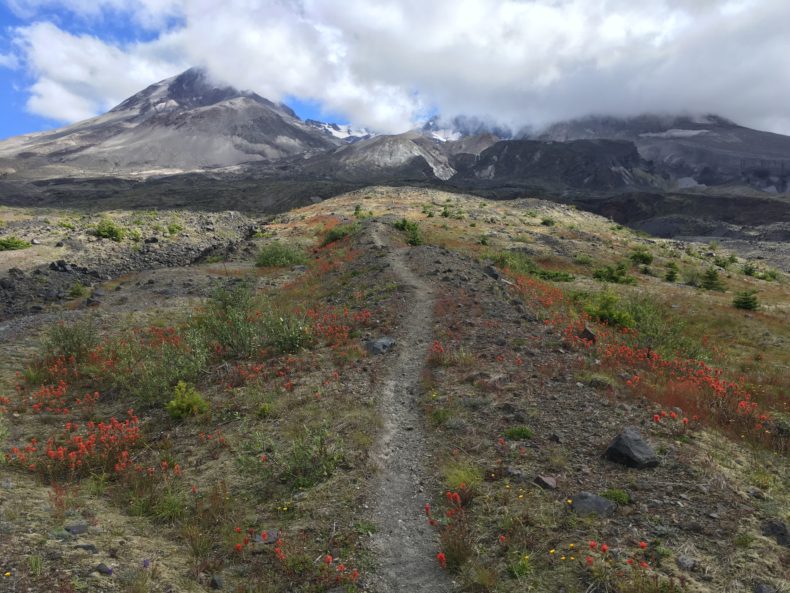
“When one is alone and
lonely, the body
gladly lingers in the wind or the rain,
or splashes into the cold river, or
pushes through the ice-crusted snow.
Anything that touches.”
–Mary Oliver, “Leaves and blossoms along the way: A poem”
It was 95 degrees out on the day I drove towards the wildfire. I wanted to wither a little. I wanted it to hurt. There is a thing cartoonists draw—a scribbled cloud of dark ink above the head of someone out of sorts. I woke up with that scribble inside my chest on more days than I admitted to anyone. The tangled lines wrapped tight around my heart and lungs. This was one of those days, when breathing felt like work.
I had lost my place, the way someone loses a page in a book. When I told the story of myself, it was as though it had veered wildly from the plot, like I was reading ahead or behind, or had picked up someone else’s book altogether. I was recovering, still, from a years-old betrayal I had moved halfway across the country to escape. I was unhappy in the city I had chosen, but unsure where else to go. Work was going well but a relentless heartbeat of anxiety pulsed through me regardless of success or failure. Though I had such dear and wonderful friends, they were scattered far and moving on with their lives in ways I could not but wanted to. I was so, so lonely.
And just like I rarely spoke of the dark lines that tightened around my lungs, I never told anyone how often I thought about dying. I calmed my nerves by picturing myself falling from a great height. Or being crushed by a boulder. Or crashing my truck at high speed into a concrete wall. I wasn’t suicidal. I was trying to release my grip. This imagined loss of control was what helped me sleep.
So I went to the fire on that burning day. I parked across a wide river from the plume of smoke, and walked into the woods. The light was orange and flat, every edge of near leaf and needle distinct; every distant mountain ridge blurred in the haze. The air tasted like a campfire. The dog ran cheerfully ahead of me and I followed her. The hike I picked was 15 miles roundtrip. I knew to bring more water, but I didn’t. We ran out close to the summit, just shy of halfway. On that steep, jagged ridge, I stared across at the mountain on the other side, borne into the sky by smoke. I imagined ascending that column of ash and gas like it was a ladder. I imagined disappearing.
I turned around. The dog was limping by the time we neared the car, and I carried her the last mile in my arms. Trees across the river—they seemed so close—burst into flame. One then another. Flashes in full sun, flashes full as sun, the day a bright coin, leaving colorful blazes on the eyes. I felt I could touch them. We made it home OK. We slept without dream, and for me, for once, without falling.
I can’t say that it has gotten a great deal better a year later, but I keep turning pages, and, when I’m bravest, I pause to write new ones. On those days, I recognize myself. Sleep comes best, now, when I remember to see my hands in the story. When I see that the story is still mine—all of it, even the parts that burn.
The weekend after my 37th birthday, I backpacked a great circle around the base of Washington’s Mt. St. Helens with some friends. The volcano exploded the year before I was born. A sizeable chunk calved off in a great flow of mud—the flash melting of glaciers—and a deadly burst of gas laced with airborne glass particles and boulders. Lava pushed out into the air. Trees laid down before that movement of earth and water and heat. They were white, dense and parallel as porcupine quills. Everything in the path of the flow died, wiped away clean.
It took a long time to get to that place, on the trail, where the world had restarted. We began in foggy old growth forest, climbed above treeline onto lichen-covered talus. We crossed deep ravines. We slept amid scratchy pines in a soaking rain. And then we crossed a river and ascended a vast slope of loose earth where the mountain was still washing away. At its top, tundra spread away toward yet more mountains across the path of the mudflow, and the tortured, unglaciated summit of Helens loomed above. Those old trees were still laid out together, bowing at the horizons. Conifer seedlings came up tall amid the grass. And nearer to the trail, it sparked with tiny, deep red strawberries. We dropped to our knees and filled our palms.
It was not the forest it had been, was different life entirely, but the berries were everywhere. They stained our lips and we ate as many as we could. They were so, so sweet in my mouth. I breathed them in. I breathed them. I breathed.
This is beautiful
brave and beautiful
Raw wilderness can be a great cleanser. Thank you for this. You put your emotions into words … Please carry on.